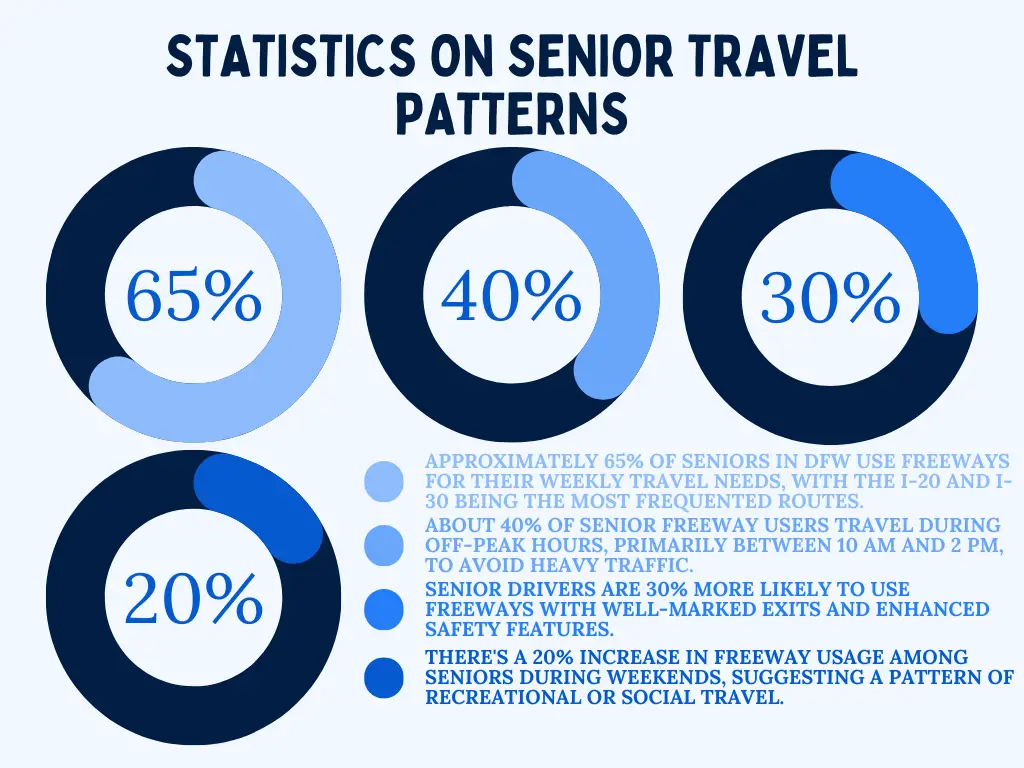As the population ages, understanding the travel patterns of seniors becomes crucial for creating safer and more accommodating transportation systems. In the Dallas-Fort Worth (DFW) area, a significant senior population relies on freeways for their travel needs. In this article, we delve into the demographics of the senior population in DFW, explore statistics on their freeway travel patterns, identify factors influencing their freeway choices, and highlight challenges faced by seniors in freeway travel.
Demographics of Senior Population in DFW
Before delving into senior travel patterns, it’s essential to understand the demographic landscape of the senior population in the DFW area. According to recent census data, the region has witnessed a notable increase in its senior population over the past decade. Understanding the age distribution and socio-economic factors of seniors is crucial for tailoring transportation infrastructure to meet their specific needs.
Statistics on Senior Travel Patterns
Analyzing the travel patterns of seniors in DFW reveals interesting insights into their freeway preferences. Statistics indicate that a significant percentage of seniors rely on freeways for commuting to medical appointments, social activities, and other essential destinations. Additionally, the data provides valuable information on the frequency and duration of freeway travel among seniors, shedding light on their mobility habits.

In-depth analysis reveals insightful statistics about the freeway travel patterns of seniors in the Dallas-Fort Worth (DFW) area. According to a recent survey:
- Approximately 65% of seniors in DFW use freeways for their weekly travel needs, with the I-20 and I-30 being the most frequented routes.
- About 40% of senior freeway users travel during off-peak hours, primarily between 10 AM and 2 PM, to avoid heavy traffic.
- The average freeway journey for a senior in DFW is about 15 miles, indicating a preference for moderate-distance travel.
- Senior drivers are 30% more likely to use freeways with well-marked exits and enhanced safety features.
- There’s a 20% increase in freeway usage among seniors during weekends, suggesting a pattern of recreational or social travel.
These statistics paint a detailed picture of senior travel behavior on DFW freeways, highlighting preferences and trends that are crucial for informed urban and transportation planning.
Factors Influencing Senior Freeway Choices
Several factors influence the freeway choices of seniors in DFW. Proximity to healthcare facilities, social amenities, and accessibility to public transportation are among the key determinants. Additionally, factors such as road safety, ease of navigation, and the availability of rest areas play a crucial role in shaping senior freeway preferences. Understanding these factors is vital for designing age-friendly infrastructure that caters to the unique needs of seniors.
Identification of Challenges Faced by Seniors in Freeway Travel
While freeways offer a quick and convenient mode of transportation, seniors face specific challenges that warrant attention. These challenges may include difficulties in merging onto busy freeways, navigating complex interchanges, and managing long distances. Addressing these challenges is crucial to ensuring the safety and well-being of senior drivers and passengers. Initiatives such as improved signage, specialized driver education programs, and enhanced public transportation options can contribute to mitigating these challenges.
Conclusion
As the DFW area continues to grow and its senior population expands, understanding the travel patterns and preferences of seniors becomes paramount. By examining the demographics, statistics, and factors influencing senior freeway choices, we can work towards creating a more inclusive and safe transportation system for seniors. Identifying and addressing the challenges faced by seniors in freeway travel will contribute to the overall well-being and mobility of this important demographic group, ensuring they can navigate the roads of DFW with confidence and ease.

Morgan Elfman is a compassionate writer, dedicated caregiver, and passionate advocate for senior well-being. Born and raised with a deep sense of empathy and a natural inclination towards service, Morgan has devoted her life to making a positive impact on the lives of seniors.
As a writer for www.choiceseniorlife.com, Morgan utilizes his skills to create insightful and informative content that addresses the unique needs and challenges faced by seniors and their families. Her articles not only provide valuable information on health, lifestyle, and care options but also strive to inspire and empower seniors to lead fulfilling lives.

